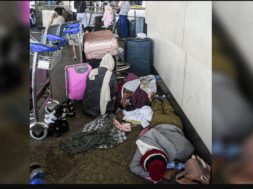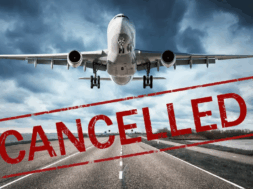
Covid-19: Nations start lockdowns as Omicron spread to 89 countries
Virendra Pandit
New Delhi: With the Omicron variant of Covid-19 virus threatening around 90 countries, marring the Christmas and year-end festivities, several nations reimposed partial or full lockdown on Tuesday as the pandemic completes two years.
While the Netherlands imposed a tough nationwide lockdown from Sunday to rein in sharply multiplying infections, South Korea, Germany, and Ireland reimposed partial or full lockdowns, as well as other social distancing measures.
The US, which reported the first death because of Omicron on Monday, has added eight more countries to the “high-risk” list after the new variant became the dominant strain circulating. However, President Joe Biden dismissed speculations of lockdown and emphasized increased vaccination.
The UK has yet to decide on lockdown on Christmas and New Year, but it is mandatory to show vaccination certificates at nightclubs and large parties. British Prime Minister Boris Johnson on Monday admitted the situation was “extremely difficult”.
Ireland has ordered the closure of entry in pubs and bars after 8 pm. While France has imposed a blanket ban on fireworks on Christmas and New Year to avoid large gatherings.
New Zealand has delayed the reopening of its international border as several other countries reimposed social distancing measures. Australian Prime Minister Scott Morrison has favored an end to lockdowns.
The Singapore health ministry is trying to find out Omicron’s role behind a potential cluster of cases at a gym. And, Israel has banned travel from 10 countries starting Tuesday.
In India, nearly 200 Omicron cases have been detected so far, with the latest Variant of Concern (VoC) spreading faster than the first Covid-19 strain in the country.
Several countries have sounded high alert ahead of Christmas and New Year festivities. The newest health crisis may also take a toll on financial markets, which fear the impact on the global economic recovery.
According to reports. Omicron infections are multiplying rapidly across Europe, the United States, and Asia, including in Japan, where a single cluster at a military base has grown to at least 180 cases.
New Zealand Covid-19 Response Minister Chris Hipkins said his country delayed the start of a planned staggered reopening of its border until the end of February next year. Earlier, the government had said quarantine-free travel would reopen by mid-January for New Zealand citizens and residents in Australia and by April 2022 for foreign tourists.
In Singapore, the health ministry was testing the people to determine whether Omicron was behind a potential cluster of cases at a gym. “Given its high transmissibility and spread to many parts of the world, we should expect to find more Omicron cases at our borders and also within our community,” Singapore’s health ministry said on Tuesday.
In the US, the Omicron variant has become dominant at a lightning speed, and claimed the life on Monday of an unvaccinated man in Texas, officials said. People queued up for Covid-19 tests in New York, Washington, and other U.S. cities to make sure whether they were infected before celebrating the holidays with family.
About whether the government would ban indoor socializing and limit tourism, he said: “We’re looking at all kinds of things … we will rule nothing out.”
In Australia, where Omicron cases have surged amid low hospitalizations, PM Morrison urged leaders to avoid further lockdowns, saying limiting the spread of the virus comes down to personal responsibility.
“We’re not going back to lockdowns. We’re going forward to live with this virus with common sense and responsibility.”
The Omicron strain was first detected in southern Africa in November and then in Hong Kong. It has so far been in at least 89 countries, and passed through over 30 variations.
The World Health Organization (WHO) warned it is spreading faster than the Delta variant and causing infections in vaccinated people, or who have recovered from the Covid-19 disease.
Its rapid spread has reignited fears that more countries may impose economically disruptive restrictions, affecting markets.
The World Economic Forum (WEF) on Monday postponed its annual meeting in Davos because of the spread of Omicron, putting off the event scheduled for January until mid-2022.
More than 274 million people have been reported infected by the coronavirus globally since the pandemic began and more than 5.65 million people have died.













